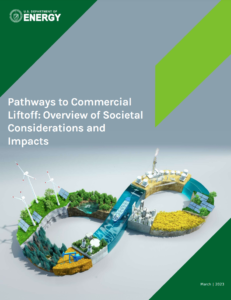Full Title: Pathways to Commercial Liftoff: Overview of Societal Considerations and Impacts
Author(s): Catherine Clark, Jill Capotosto, Katrina Pielli, Shalanda Baker, Betony Jones, Christy Veeder, Kate Gordon, and Wahleah Johns
Publisher(s): US Department of Energy
Publication Date: March 20, 2023
Full Text: Download Resource
Description (excerpt):
How first-of-a-kind energy infrastructure projects impact—and are impacted by—society can determine market liftoff. Individual projects introduce far-reaching, multi-generational changes to local communities, while also setting the standard forfollow-on projects unfolding across the country. In this way, social considerations and impacts not only influence the success of each individual project, but ultimately determine social acceptance and adoption. As first movers, early players have an outsized role in shaping whether the clean energy transition is supported by, and supportive of, communities and workers across the country: new technologies can contribute to a more equitable and just future, or follow entrenched patterns of racial and socio-economic injustice in the U.S. energy and industrial systems. With much of the country’s existing energy and industrial infrastructure located in communities of color, tribal communities, and working-class communities, energy production and use has historically posed outsized health, environmental, and social risk to these communities, while creating a complicated economic legacy. The pollution and health risks associated with some energies have falsely been cast, by some corporations, politicians, and industry interest groups, and benefits to local economies, including tax revenues that can support critical investments in roads, health care, libraries, schools. However, these benefits can be undercut by other economic and safety risks if long-term community well-being is. And while some energy sector salaries, including for oil and gas are higher on average than the annual mean wage in the U.S., Black, African American, and Latinx workers are underrepresented in the energy sector overall and are less likely to hold high-paying jobs with benefits. Recognizing the potential impact of energy infrastructure, clean energy entrepreneurs can choose to pursue future energy development that proactively supports host communities, uplifts the workforce, takes steps to mitigate possible harms, and responds to the legacy of the U.S. energy system.
